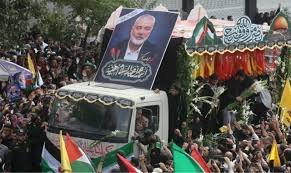The funeral for Hamas leader Ismail Haniyeh took place in Qatar, escalating tensions as Israel braces for potential retaliation. Explore the implications and regional reactions in our comprehensive coverage.
The funeral for Ismail Haniyeh, a prominent leader of Hamas, was held in Qatar on [insert date], drawing significant international attention and raising tensions in the Middle East. Haniyeh, known for his pivotal role in the Palestinian resistance movement, passed away under circumstances that have not yet been fully disclosed, sparking a wave of speculation and concern regarding the future of Hamas and its strategies.
The Funeral Ceremony
The funeral took place in Doha, Qatar’s capital, where Haniyeh had been residing for several years. The event saw a massive turnout, with thousands of mourners, including high-ranking officials from various countries, representatives of different Palestinian factions, and members of the Muslim Brotherhood. The ceremony was marked by emotional speeches and a profound sense of loss among the attendees.
Qatar’s Emir, Sheikh Tamim bin Hamad Al Thani, expressed his condolences to Haniyeh’s family and the Palestinian people, reaffirming Qatar’s support for the Palestinian cause. The Emir’s presence underscored the close ties between Qatar and Hamas, as well as Qatar’s broader role in the region as a mediator and supporter of Palestinian interests.
Regional Reactions and Tensions
Haniyeh’s death and subsequent funeral have amplified already heightened tensions between Israel and Hamas. Israeli officials have expressed concerns over possible retaliatory actions by Hamas, which could include rocket attacks or other forms of aggression. In response, the Israeli Defense Forces (IDF) have been placed on high alert, with increased security measures implemented in border areas and key cities.
The situation is further complicated by recent events in the West Bank and Gaza Strip, where clashes between Israeli forces and Palestinian protesters have intensified. The death of Haniyeh, a symbol of resistance to many Palestinians, is likely to fuel further unrest and violence in these regions.
International Implications
The international community is closely monitoring the developments, with various countries calling for restraint and dialogue. The United Nations has issued a statement urging both sides to avoid actions that could escalate the situation. Meanwhile, the United States and European Union have reiterated their support for a peaceful resolution to the Israeli-Palestinian conflict.
Haniyeh’s passing also raises questions about the future leadership of Hamas. Known for his charisma and strong leadership, Haniyeh was a unifying figure within the organization. His absence leaves a significant void that will be challenging to fill. Potential successors include Yahya Sinwar, the current leader in Gaza, and Saleh al-Arouri, a senior figure within the organization. The transition of leadership will be a critical factor in determining the direction of Hamas’s policies and actions in the coming months.
The Broader Middle Eastern Context
The Middle East is already a region fraught with conflicts and political complexities. Haniyeh’s death adds another layer of uncertainty to the geopolitical landscape. Countries such as Iran and Turkey, which have historically supported Hamas, are likely to closely watch the developments and may adjust their strategies accordingly.
In Lebanon, Hezbollah has expressed solidarity with Hamas, with its leader, Hassan Nasrallah, issuing a statement praising Haniyeh’s contributions to the Palestinian cause. This solidarity underscores the interconnected nature of various resistance movements in the region and the potential for broader conflicts involving multiple actors.
Conclusion
Ismail Haniyeh’s funeral in Qatar marks a significant moment in the history of Hamas and the broader Palestinian struggle. As the region grapples with the implications of his death, the international community remains on edge, wary of potential escalations in violence. The future of Hamas’s leadership, Israel’s response, and the reactions of key regional players will be crucial in shaping the next phase of this longstanding conflict.
The coming days and weeks will be critical in determining whether a path toward de-escalation and dialogue can be found, or if the region will descend into further chaos and violence. The legacy of Ismail Haniyeh, a controversial yet undeniably influential figure, will undoubtedly continue to impact the dynamics of the Israeli-Palestinian conflict for years to come.


